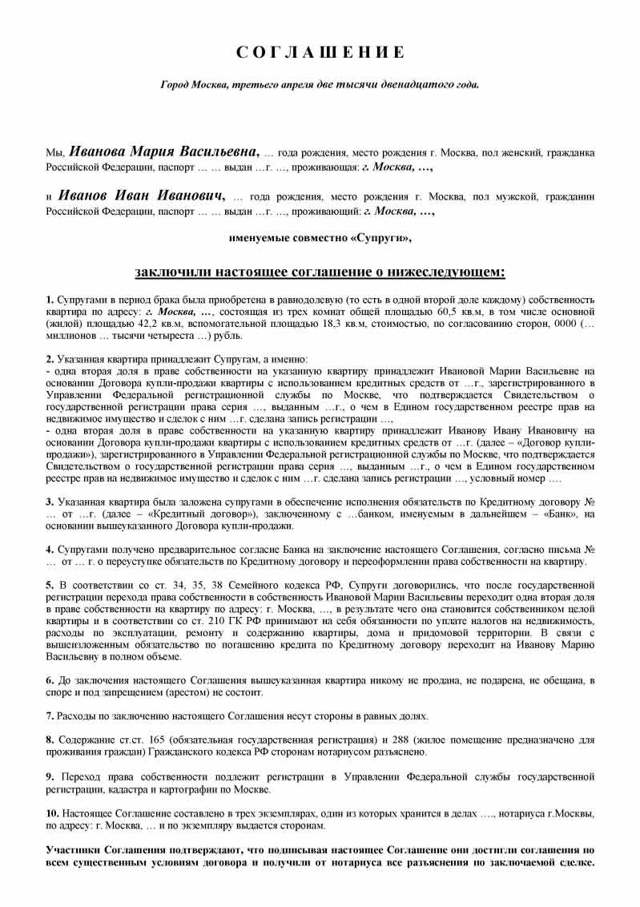
In the practice of claims proceedings, some of the most complex cases are those involving the division of property of former spouses. Often the parties consider themselves offended, insulted, and the desire for revenge is mixed with the necessary legality, exaggerating the concept of justice.
It’s not so bad if the property can be divided in kind, and this will be carried out by a court decision.
However, there is indivisible property, i.e. one that cannot be naturally divided into parts, assigning each side its own.
For example, former spouses own an apartment: what options are there for dividing it? Under what circumstances can one of the parties be compensated for the cost of its share under Ukrainian laws? Let's figure it out.
In what case is it paid?
The legal grounds for paying compensation for part of the common joint property of one of the parties are two articles of the Family Code:
- Article 69 of the Family Code establishes the very possibility of spouses/former spouses dividing their shares in such property.
- Article 71 of the Family Code determines the method of division of indivisible property: awarded to one of the parties (clause 2 of Article 71 of the Family Code) with compensation of the cost to the second party (clause 4 of Article 71 of the Family Code).
You need to know that the award of financial compensation for a share of property is possible only with the consent of the party to whom this compensation is awarded.
As in most other cases, an agreement on the division of property with compensation for one of the parties can be reached without a trial or can be reached in court. Let's consider both options separately.
Agreement on the division of jointly acquired property of spouses with compensation
 We have already talked in detail about exactly how such an agreement is drawn up. You can view the material here. Let us note just a few important points:
We have already talked in detail about exactly how such an agreement is drawn up. You can view the material here. Let us note just a few important points:
- The right to such an agreement is given, among other things, by paragraph 1 of Art. 69 of the IC, which states that property can be divided, while the legal status of the relationship does not matter .
- If the matter concerns real estate, such an agreement must be notarized (clause 2 of article 69 of the IC).
In addition to the general necessary parameters of such an agreement, we recommend that you specify the following in detail :
- The exact amount of compensation.
- Payment deadline.
- The order of payments (if an agreement has been reached to pay several times).
- Payment method (cash, bank transfer, etc.).
- Methods for recording the fact of receipt of funds (receipt, bank transactions, etc.).
That is, in the contract itself, everything related to the fact of receiving funds should be spelled out in detail. We will give one extraordinary advice on this matter:
Before concluding an agreement, imagine yourself for a few minutes as an attacker who wants to deceive the other party. Think of ways of such fraud that the “attacker” would introduce into the contract. Make a list of such actions. Make an agreement so that you cannot be deceived by any of the methods you have come up with!
Exchange of property or compensation in kind
Exchange of property or compensation in kind is one of the special cases of a pre-trial agreement. This option is not directly stated in the law, however, Art. 69 of the IC allows spouses (including former spouses) to dispose of any joint property.
To avoid possible problems in the future and not give reasons for a possible challenge to the agreement, we recommend not concluding one agreement in such cases, but simultaneously signing a package of agreements - one for each property . In this case, there is no need to document that one property is compensation for part of another.
Please note that we use the terminology “not recommended”, because... and the general agreement is not illegal. But the second option seems more reliable.
During legal proceedings, when concluding a settlement agreement, on the contrary, it is the general agreement that is drawn up. More on this in the next section.
Compensation to a spouse through court
In cases where a pre-trial solution is impossible, a claim is filed in court. The initiator is one of the parties. We talked in detail about filing a claim and the process in this material.
Here we will briefly go through the main stages, and focus on the specific features of cases with compensation for part of the common property.

- A lawsuit is being filed.
- A fee is paid.
- A lawsuit is filed
- A review is underway.
- A court decision is made.
This is the general sequence for all claims proceedings. Let's look at the features below.
Process nuances
The main feature is that clause 4 of Art. 71 of the Insurance Code establishes the mandatory consent of the party to whom compensation is awarded to such a scenario.
However, the article does not mention the need for the consent of the other party. However, a court decision to which one party agrees and the other does not is difficult to implement, and the need to deposit funds for the payment of such compensation on the deposit of the court before the decision is made (clause 5 of Article 71 of the Criminal Code) makes this option impossible.
There are only two options : either the property will be left jointly owned, or the parties will come to an amicable agreement.
Settlement agreement
Termination of the process by an agreed decision of the parties with the conclusion of an agreement to resolve the controversial issue is called a settlement agreement.
This aspect is regulated by the Code of Civil Procedure, and consists of a number of rules:
- At any stage of the process, the plaintiff has the right to refuse claims and/or the defendant has the right to admit them (clause 1 of article 206 of the Civil Procedure Code).
- The signed settlement agreement is approved by the court (decision), and is an integral part of the court decision (clause 4 of article 207 of the Code of Civil Procedure).
- The same clause indicates that the signing of a settlement agreement terminates the proceeding of the case.
- This agreement is an executive document. Accordingly, if one of the parties refuses to comply with its terms, the enforcement mechanism may be activated (Article 208 of the Code of Civil Procedure).
That is, in the interests of the parties, the court will persuade them to sign a settlement agreement. Otherwise, ownership will remain common.
Exchange of property
This option is possible. , an appraisal examination may be assigned to all property ; however, if the parties obviously agree to the proposed division/exchange, it can be done without it.
In essence, we have before us the same settlement agreement, where material compensation is used instead of financial compensation. Accordingly, it will also become an executive document with all the ensuing consequences.
Unlike a pre-trial agreement, a settlement agreement spells out everything together, every item, object, cost, etc.
If the parties do not agree on the price of the divided object, then the court appoints an examination. The amount of compensation, in most cases, corresponds to the value of the share in the property:
- Shares can be established in advance by separate agreements (including a marriage contract).
- If there were no such agreements, the shares are considered equal (Clause 1, Article 70 of the Family Code).
- Under a number of circumstances, the court has the right to change the equality of shares in favor of one of the parties: if the property was improperly maintained, funds for the maintenance of children were not paid, income was concealed, etc. (Clause 2 of Article 70 of the UK).
- The share of the spouse with whom the children live may be increased (by court decision).
Based on these principles, the share of the second party will be calculated, and accordingly, its value will be established. But let us remind you: without the consent of this party, compensation cannot be assigned, which means its amount must be agreed upon .
Payment period for division of property
Specific payment periods may be set forth in the agreement(s) itself. The commencement of the signed agreements is determined by:

- For pre-trial agreements . Clause 2 of Art. 69 of the Insurance Code requires notarization of real estate agreements, and clause 3 of Art. 640 of the Civil Code establishes that such agreements are valid from the moment they are certified by a notary.
- For settlement agreements . Since this agreement is part of the court decision, it comes into force along with it: in accordance with paragraph 1 of Art. 273 of the Code of Civil Procedure - after the expiration of the period for possible filing of an appeal.
If compensation is possible with a one-time payment (action), then payments should be made immediately, in the absence of agreements. If an agreement is reached on several payments, then from that moment the agreement must be fulfilled.
The technology for paying compensation involves depositing the necessary funds into the court's deposit account before a decision is made on the basis of clause 5 of Art. 71 SK.
Instead of alimony
The husband/wife who is entitled to compensation may resolve the issue differently if they have children. If alimony is prescribed, then with the agreement of both parties ! Art. 190 of the Family Code allows you to transfer your part of the common property to one of the parties if they refuse alimony.
Conclusion
It is quite possible to receive compensation for your part of the indivisible property. However, this will require an agreement to be signed at one stage of the project. Before starting long and costly proceedings, perhaps it makes sense to answer the following question: if you still have to negotiate, maybe it makes sense to do without a trial?
How useful was the article?
Loading…
Compensation of property during division
It is not so easy to divide property into equal shares. Therefore, monetary compensation in this case is often the only way to distribute it truly equally if we are talking about division through the court.
In out-of-court agreements between spouses, payment of compensation in money is also often used, since one of the spouses wants to receive property, while the other agrees to money.
In what cases is compensation paid when dividing marital property, and how is it formalized?
If the division of property and the establishment of the need to compensate for the imbalance in it is established by agreement, then in fact this operation will be equated to a sale and purchase, that is, the income from it will be included in the tax base. But if compensation is transferred to the ex-spouse for a share in real estate, then you can get a tax deduction and not pay anything - there are many more such nuances.

If the spouses have entered into a marriage contract or have drawn up an agreement on the division of property, then they themselves determine whether there will be compensation for property during the division of property, and in what amount. For example, by agreement, all property can go to one of the spouses, for which he pays a certain amount to the second.
If an agreement is not concluded, then it will be necessary to resort to division of property in court.
According to the law, the shares of spouses should be equal, but it often turns out that it is not possible to divide the common property equally. Then you also need to use the mechanism of monetary compensation.
So, in the case of division of property through the court, compensation must be paid only when one of the spouses receives more property than his share.
As for the time aspect, it is possible to divide property and determine whether compensation is needed while still being married, during a divorce, or within three years after it. After this, the statute of limitations comes into effect, and any changes will no longer be possible.
How to determine the amount of monetary compensation?
To determine the amount of compensation, you must first evaluate all joint property - this assessment is carried out by an expert who can be contacted by either party. The expert must conduct an inspection, analyze documents, and then draw up a report on the value of the property, taking into account its wear and tear or, on the contrary, improvements made.
If the assessment was carried out by both parties, and their results differ markedly from each other, it is necessary to conduct a forensic examination.
After the assessment, everything that can be divided into equal parts without damage is divided into them, then the property that should go to one of the spouses is determined.
After this, it remains to determine who received more and assign compensation in the amount of half the difference in the value of what was received.

There are several important nuances:
- If the amount of compensation is high, it can be assigned after agreement with the payer, but if the amount is small, this is not required. However, there is also such a factor as the parties’ interest in the property - the degree of interest is decided by the court individually, according to the facts and assessments of the judges themselves. If it was considered that one party was interested in some property much more than the other, and it was decided to award it to her, but the other party refuses monetary compensation, this does not mean at all that the decision will change.
- Compensation can be made not only in money, but also in other property. Thus, the disproportionality can be eliminated by transferring some other property to the ex-spouse.
- After receiving compensation for the share, the citizen loses ownership of it, and then will no longer be able to demand its sale.
- All income of individuals is subject to appropriate tax. The compensation will also be considered income, which means that it will also be necessary to make contributions to the state. But you can exercise your right to a tax deduction if the property for which compensation was received has been owned for at least three years. Instead, it is possible to resort to another right: to reduce the tax base due to expenses associated with obtaining this income. If you can prove the amount for which you purchased the property, it will be deducted from your tax base. Let's illustrate this with an example. When dividing the property, your spouse received a car valued at 600,000 rubles. Your compensation for it should have been 300,000, and tax should have been deducted from this amount. However, if you prove that the car was purchased for 700,000 rubles four years ago, it turns out that you did not receive any income from its “sale” and do not have to pay tax.

And a little about what property is subject to division, there are also some subtleties here. So, all common property owned by the spouses or by third parties is subject to division.
In addition to things, bank accounts, real estate, joint property will also include property rights and obligations of spouses arising as a result of their disposal of common property.
This means that the calculation also includes common debts, which will be distributed in accordance with what shares of property are awarded to the spouses.
If only one of the spouses bears the obligation, then the penalty is applied to his personal property or to the share of the joint property that should go to him.
According to domestic law, a creditor has the right to demand that the debtor sell a share in the common property in order to pay off the debt, if this cannot be done by other means.
If the second participant in the common property does not want to acquire the debtor’s share, then it can be sold at public auction.
Collection of monetary compensation through the court
The issue is resolved through the court if the spouses cannot conclude an agreement.
The court will divide the property and set the amount of compensation; it will also set the period within which the funds must be paid, taking into account the financial situation of the payer. If he then does not make payments, collection is carried out through the bailiff service, who are provided with a writ of execution - a court decision. It’s a different matter if we are talking about non-payment of the amount determined by agreement. Then it will be necessary to file a lawsuit in court to collect the funds that the debtor is obliged to pay under the contract, providing the document as evidence of the contract itself.
Statement of claim for division of property
The application is drawn up in a strictly prescribed form. You can use the example provided as a guide. It is worth adding a short comment to it, revealing the process of drawing up the document.
The header contains the following information: the court district to which you are applying, as well as the name of the judge; your details and the details of the defendant: full name, contacts; claim price.
Then comes the introductory part, which indicates the date and place of the marriage, and in case of a divorce that has already taken place, also the date of dissolution of the marriage. If there are minor children, their age is indicated and with whom they will live. The text of the claim reveals the reason for its filing and evidence of the plaintiff’s position.
The following is a description of real estate items with names and important features. Various nuances stand out. For example, that the property should be left behind by you, paying compensation to the second spouse, since it is the children who remain with you.
Finally, there is a final part that states the requirement and lists the attached documents.
Statement of claim for division of property after divorce
Documents attached to the claim
The following documents must be attached:
- a copy of the statement of claim for the second party;
- marriage certificate, as well as divorce, if it has already taken place;
- a receipt indicating that the state fee for filing a claim has been paid;
- title document for the property that is subject to division;
- act of assessing the value of the property subject to division;
- birth certificates of children under the age of majority.
In addition, additional paperwork will be required depending on the type of property being divided. So, if this is an apartment or a plot of land, then you will need a certificate of ownership, for a car - a technical equipment passport, a purchase and sale agreement, an insurance policy, and so on.

If any of the documents are missing, you will need to make a request to government services so that they provide this document. If this request is refused, then it will be possible to show the refusal to the court and issue a judicial request. As a result, you will most likely receive the document, but receiving it will be a rather long and difficult process - therefore, all papers should be stored in a safe place.
Court decision to recover monetary compensation
People often ask how long the process takes, but it is impossible to answer unequivocally - the scope is quite wide, and if in some cases everything is completed in a month, then in others the proceedings can last for 6-8 months - it all depends on the complexity of the case. If it is complicated, and permission will require requesting a lot of papers, interviewing witnesses, and so on, then it is clear that it will drag on.
But with mutual agreement of the parties, one can count on a much faster process.
At the very beginning, it is worth carefully weighing all future costs and once again trying to come to a compromise, even if this was not possible before. Perhaps it even makes sense to give in on something, since from a long and exhausting process it is quite possible to lose much more - at least a lot of time, and maybe even money.
If you are interested in examples of specific court decisions, now it’s easier than ever to look at them - each major court has its own website where you can familiarize yourself with them. You can even find a specific solution by number. Let us give some examples from judicial practice.
Example one
The couple had an apartment, but during the divorce, the wife received only compensation for half of the furniture and household appliances that the family owned. How did this happen? The couple's apartment was bought by the husband's parents, while the parents were still alive, and the gift agreement was not drawn up. It turns out that although the family used the property, it legally belonged to the husband’s parents.
Moreover, even if a gift agreement had been drawn up, the spouse would still not have received a share during the divorce, since the apartment was not purchased with family money. Since the apartment remained with the husband, the court decided not to divide the furniture and household appliances that made up its furnishings. And with the consent of the husband, he ordered him to pay compensation for the half that would otherwise have gone to his ex-wife.
Example two
A couple of years before the divorce, the wife sold a two-room apartment, which was her personal property. By adding to the amount received from the sale, the couple purchased a four-room apartment, while the husband renounced ownership of the purchase. However.
During the divorce, he applied for division of the apartment, and by court decision received compensation of 20% of the cost of the apartment. How did this happen? According to the documents, the court found that the cost of the two-room apartment sold by the wife was 60% of the purchased property. Therefore, this 60% will be the wife's personal property.
But the remaining 40% is joint property, which needs to be divided in half. The husband's refusal of property rights in this case means nothing.
The division of property is a complex and lengthy process. Even professionals cannot be completely sure what the outcome will be, because many factors influence the result.
In addition, there is a risk that the process will be expensive. as appraisers.
Therefore, it is better to try to reach an amicable agreement before going to court, and to do this only when all possibilities for out-of-court settlement have been exhausted.
Compensation for division of property | Legal consultation

Family Law Lawyers
— Divorce and division of property in court, — Determination of the procedure for communication with children and their place of residence, collection of alimony, — Deprivation and restoration of parental rights.
Or call us right now! We are in touch!
+7 921-904-34-26
After going through the procedure for dividing the jointly acquired property of the spouses, it is possible to receive compensation.
The right to receive it is the spouse to whom, as a result of the process, a smaller share of the total property was transferred. In most cases, compensation for the division of property is in monetary form.
However, some ex-spouses find a compromise and agree on another compensation option.
Article 38 of the RF IC describes the features of the process involving the division of spouses’ property acquired during marriage. According to this article, this is possible by filing a lawsuit in court. Everything that was acquired jointly by husband and wife during marriage and after divorce is subject to division.
8-921-904-34-26 legal consultations on divorce and division of property in St. Petersburg 

The Family Code of the Russian Federation also sets out the rules that guide the judge in the legal process for the division of property. The document states that the court has the right to determine how property should be distributed between the parties.
If a decision is made according to which one of the spouses is given more valuable property than what the other spouse received, compensation may be awarded upon division of property .
The amount of compensation or its equivalent is also established.
If it is not possible to pay compensation in monetary terms and both spouses are not against another method, then, according to the law, it may take a different form.
For example, if the first spouse inherited some expensive property, then the second, by agreement, can use it for a certain period of time.
It is also possible to provide services and perform various types of work instead of paying a sum of money.
Compensation for the division of property is established within the framework of a court hearing in the form of payment of a specific sum of money, the amount of which is strictly established. There is a certain procedure for calculating it. First, the value of all property is calculated. Then the entire amount received is divided in half.
This is the share that the spouses would receive without mutual claims if all movable and immovable property were converted into cash equivalent. After this, it is determined what exactly which spouse will get.
If, according to such a distribution, the first spouse received property that exceeds the calculated half share in value, then he will pay compensation to the second spouse.
Ask a question, we are online! 8-921-904-34-26 legal consultations on divorce and division of property in St. Petersburg Details
Collection of monetary compensation upon division of property in [year]
to ask a lawyer . It's free!

The collection of monetary compensation for the division of property in 2023 is carried out in a forced form through the court.
During a divorce, the joint property of the spouses can be divided equally between them, or maybe in different proportions.
In the event that the share of one spouse in the division is a large part, he will have to pay monetary compensation to the other spouse. But it often happens that a person voluntarily does not want to compensate the money.
What property is subject to division?
Spouses have the right to divide the property that they acquired during their legal marriage. Since funds from the general family budget were spent on the purchase, the property is shared.
Read more: What is marital property and what is not?
Most often, spouses share:
- Residential real estate;
- Land;
- Transport;
- Cash deposits;
- Household items;
- Luxury items, jewelry.
Not only property rights, but also the obligations of spouses are subject to division. This is stated in Part 3 of Art. 39 of the Family Code. The spouses will have to pay off their common debts in proportion to their shares.
Attention: During a divorce, the personal property of the spouses will not be divided: objects acquired before marriage, gifts, inherited objects, clothing, shoes.

Is compensation due for division?
Payment of compensation upon division of property is provided for in Part 3 of Art. 38 of the Family Code. Compensation is paid if the value of part of the property of one spouse exceeds the value of the part of the second spouse. Funds must be transferred voluntarily. Otherwise, you will have to collect them through the court, which is much more problematic and longer.
How is property division carried out?
Division of property by law can be carried out in two forms:
- By agreement;
- Judicially.
The division of property by agreement is the conclusion of a written agreement in which the parties stipulate the list and value of the property that they will own after the division.
Note: In accordance with the provisions of the Family Code, the shares of spouses in joint property are recognized as equal.
In the separation agreement, spouses may stipulate that property does not have to be divided equally. They can divide the property the way they want. In this case, it is important that the party that receives the majority pays compensation to the other party. Its amount is specified in the agreement.
The property of spouses who cannot agree on the division of property is divided in court. The judicial procedure is carried out much more often. During this process, the court determines the shares of each spouse and sets the amount of compensation if the shares are awarded unequally. Execution of a court decision is mandatory for all participants in the process.
The mechanism for paying monetary compensation for property during a divorce was developed by legislators for many reasons. First, it allows for an objective and fair division of property. Secondly, payment of compensation is relevant in cases where the subject of the dispute is indivisible property, which cannot be divided without losing its properties.
How to calculate compensation
When dividing property, an important question is: what amount of compensation is due to the spouse who received a smaller part of the property? To understand how much money should be paid to a spouse, it is necessary to objectively assess the value of the property. To do this, an independent examination is carried out, during which the market price is established.
Help: Market valuation is the determination of the most accurate value of an object at which it can be sold subject to competition.
Information obtained as a result of property assessment is considered reliable and can be used in court. But, if each spouse has carried out an assessment and its results have a significant difference, a forensic examination is appointed, the data of which will be taken as the basis for the court’s decision.
When compensation is not due
The spouse whose share is reduced during division may not always qualify for monetary compensation. In a number of cases, property is divided in different shares without payment of compensation:
- If things necessary to meet the needs of minor children are divided;
- If during the marriage the spouse squandered the joint property to the detriment of the family;
- If the spouse has not brought income to the family budget for a long time without good reason.
Separately, we should highlight situations where a husband and wife lived without registering a marriage (in a so-called civil marriage).
From a legal point of view, this form of relationship between a man and a woman does not give rise to marital rights and obligations.
Accordingly, their property interests are not protected by law, which means that they cannot subsequently claim division of property and payment of compensation.
Learn more about the division of property acquired before marriage.
Methods for collecting compensation
The procedure for collecting monetary compensation during the division of property is carried out in court if the spouse does not want to pay it voluntarily. This can happen either when concluding an agreement on the division of property, or in case of failure to fulfill a court decision, in accordance with which the payment of funds was ordered.
Depending on how the property was divided, there are two methods of recovery.
Applying to court for monetary compensation
This case is relevant if the spouses have entered into a separation agreement, under the terms of which one of the spouses compensates the other for part of the amount. If the terms of the contract are violated, the injured party has the right to go to court.
You will also have to contact the judicial authorities when the spouses were unable to divide the property on their own.
The process consists of several stages:
- The interested spouse files a lawsuit demanding division of property and payment of compensation;
- A court hearing is held, during which the demands of the parties are heard, the title documents for the disputed property are studied, the circumstances influencing the increase (decrease) of shares in ownership are clarified, and, if necessary, a forensic examination is ordered;
- Based on the assessment report or the results of a forensic examination, a decision is made on the division of property and the amount of compensation is established.
- The court decision must indicate a list of objects that remain in the possession of each spouse, their shares in ownership, the amount of compensation and the period for its payment.
Important: The statute of limitations for cases of division of joint property is three years. It is calculated from the moment the citizen learned about the violation of his rights.
Contacting the bailiff service to enforce a court decision
If a court decision on the division of property and the award of compensation has entered into force, and the spouse does not comply with it, you must contact the territorial body of the FSSP.
Bailiffs are obliged to use all methods available to them to force a citizen to pay compensation (by deducting the amount from earnings or other income).
If a person does not have a source of income, then more stringent sanctions will be applied: seizure of property and its sale at auction in order to reimburse the amount of funds in favor of the claimant.
Collection of monetary compensation during division of property: procedure, documents

If, after a divorce, the ex-husband and wife cannot equally divide their jointly acquired property, the solution becomes monetary compensation when dividing the property of the spouses . This is a legal tool that allows you to allocate unequal shares without violating the rights of either party.
The division of property is carried out either through a peaceful agreement or through the court.
If the spouses, when creating a family, entered into a marriage contract or an agreement on the division of property, then they can independently decide on the distribution of their property.
Often such a document initially contains information about how much compensation one spouse must pay in the event of a divorce, and what part of the property goes to the other spouse.
Download a sample property division agreement
If there is no marriage contract, and it is not possible to agree peacefully on the division of your joint property, then the matter is resolved in court.
In general, by law, each of them is entitled to an equal share of the property.
While the personal property of the husband and wife, acquired before marriage or provided from relatives under documents of gift or will, is not included in the division.
It often happens in judicial practice that it is not possible to divide property into equal halves.
To solve this problem, one of the parties is given the majority of the property, but he must pay the other party the missing amount to equalize the value of his shares.
The legislation provides for only one situation when payment of monetary compensation by spouses is applied. This is a convenient and legally correct way to equalize the value of shares during division.
To determine the amount of compensation, it is necessary to carry out an assessment procedure of all jointly acquired property of the spouses. To do this, the court or the applicants themselves invite an independent expert.
This is a specialist who works in an appraisal firm or does work at home, but has the appropriate license.
This service is paid; depending on the region and the volume of property, the applicant will have to pay from 5 to 20 thousand rubles.
Based on the results of the appraisal work, the value of all items of property is established and the total amount is determined. If the shares of the spouses are not equal in value, then during the trial the difference is calculated: the amount of the cheaper part is subtracted from the more expensive part.
The resulting difference is the compensation to be paid to the spouse with the more valuable part of the property.
If the compensation is not large, then the court decides to pay it without the consent of the parties. If a large difference between the shares is identified, the consent of the spouses to its payment is required.
If a participant in the case is unable to give such an amount to the opponent, he has the right to refuse and divide the property equally without paying compensation or choose an option with a smaller amount of the difference.
One of the spouses who received monetary compensation is required to pay income tax on this amount. This rule is indicated in paragraph 1 of Article 210 of the Tax Code of the Russian Federation. The party receiving the refund is entitled to a tax deduction. But this is an exception, and it only applies to the amount of compensation from the sold apartment, which is in common ownership.
Before going to court, the plaintiff must pay a state fee. A receipt confirming payment of the required amount is a mandatory attachment to the application.
The entire process of dividing property in this way takes several months. This is due to the complexity of the case - the court needs to take into account the rights of each party, so according to the law, the property must be divided into two equal shares.
The trial is based on the provisions of the Family and Civil Codes. They regulate the rules for the transfer of property, distribution between the parties, and the payment period.
After assessing the property, allocating shares and establishing the amount of compensation, a receipt is taken from each spouse, which has legal force.
The law has certain rules according to which property is divided between former spouses. In particular, a list of property objects has been established that are not considered by the court when distributing shares and assessing them; they remain with their previous owner. These types of property include:
- inherited or received through an official donation procedure;
- purchased before marriage;
- real estate privatized for one owner;
- personal items;
- children's property.
Jointly acquired real estate, cars, furniture, equipment, shares, securities, savings and deposits, and business are subject to division between spouses in equal shares. Many pieces of property cannot be divided equally, so compensation is the only option.
By law, the business of one of the spouses must be divided. But in order to be the full owner of your business and not depend on the departing husband or wife, the organization is transferred to one of the parties, for which she must pay compensation on account of the share in the business.
A settlement agreement allows the parties to resolve the issue independently, without resorting to the help of a court.
If they manage to reach an agreement, they can avoid spending a lot of money on the services of specialists, state duties and taxes on compensation. They have the right to decide for themselves which part of the property will go to whom.
In this case, it is not necessary to divide everything equally; you can even leave all the property to one of the spouses. It all depends on the agreement.
The agreement must be in writing. It must contain paragraphs describing all property, its value and distribution between the spouses. Each party puts its signature. Its conclusion is possible at any time - during marriage, during divorce proceedings or after it.
The document must be written in triplicate and certified by a notary - only after that it acquires legal force. You will have to pay for a lawyer's services.
If you enter into an agreement orally, problems may arise - one of the parties will refuse to comply with the terms, and this will not be provable in court.

Monetary compensation helps solve the problem of division and avoid disputes over more or less of the property left to the spouses. Many people do not want to contact their ex-husband or wife regarding property issues, so as not to incite conflicts. In this case, it is most convenient to entrust the matter to the court, where the interests of each spouse will be taken into account and an adequate amount of compensation will be calculated.
In the event that the husband and wife could not agree, the court will distribute their property in accordance with the law. When accruing compensation to the obligated party, a deadline is set for its payment. If funds are not transferred within the allotted period, you need to go to court to enforce their collection.
Algorithm of actions:
- the applicant collects a package of documents and draws up a claim.
- you must pay a state fee. Its amount depends on the value of the claim, that is, the value of all property. The amount varies from 400 rubles to 60 thousand.
- the payment receipt is attached to the rest of the documents and everything is taken to court. If property worth less than 50,000 rubles is divided, then you need to go to the magistrate court, if more than this amount, then to the district court.
- a hearing date is set where all the circumstances and reasons for the defendant’s evasion from paying compensation are clarified.
- the court either makes a guilty decision or recognizes the reasons for non-payment as valid.
Download a sample statement of claim for the division of marital property. The statement is drawn up in three copies, which are intended for the plaintiff, the defendant and the judge. The other party to the dispute is sent a notice with the date and time of the court hearing.
To file a claim, the following documents are required:
- applicant's passport;
- certificate of divorce;
- a court order ordering the defendant to pay compensation;
- receipt of payment of state duty;
- other documents related to the case (on the sale of property).
Original documents are required in court. If copies are provided, they must first be certified by a notary.
The statement of claim is accepted within three years after the divorce. If the spouses have entered into a settlement agreement and formalized it legally correctly, then in the future they are deprived of the right to review the case.
If you have any questions, our duty lawyer is ready to advise you free of charge ↓
Collection of monetary compensation upon division of marital property

According to the norms of family law, property purchased during a marriage with common money is considered jointly acquired and is subject to division. Each spouse has the right to allocate ½ part. But there are situations when allocating equal shares is impossible. In this case, monetary compensation for property in a divorce is applied.
Is it possible to receive monetary compensation and in what cases?
The possibility of receiving monetary compensation is regulated by Art. 38 of the Family Code of the Russian Federation.
Payments are applied in the following cases:
- jointly acquired property cannot be divided into equal parts;
- impossibility of allocating a share in kind.
If the divorce spouses were unable to resolve the issue peacefully, the property dispute is considered in court. Receiving a material payment deprives the spouse of the right of ownership (use, disposal) of the thing.
Alternative to monetary compensation:
- provision of service;
- completing of the work;
- transfer of property for temporary use;
- exchange for personal property.
What is subject to division in a divorce?
The process of division during divorce covers property acquired with common funds after the registration of the marriage relationship.
Art. 34 of the RF IC defines the following list:
- cash (deposits, income of a married couple, pension savings);
- real estate;
- movable property (household appliances, furniture, electronic equipment);
- transport;
- debt (credit) obligations;
- joint rights.
If there is no marriage contract or voluntary agreement, the division is carried out in accordance with the norms of current legislation:
- RF IC (Articles 34, 36);
- Civil Code of the Russian Federation (Articles 252-256);
- Code of Civil Procedure of the Russian Federation.
Calculation of monetary compensation
An expert assessment of joint property will help you find out the amount of monetary compensation. The principle of calculation is to determine the difference between shares when dividing property in kind. The spouse who received the smaller portion has the right to receive compensation.
In judicial proceedings, the power of settlement lies with the court. If the amount of payment is significant, the consent of the parties to the process is required.
Example of a section with compensation through the court
The Karpachov couple applied to the court with a request for a divorce and division of jointly acquired property: a car, furniture and household items.
To determine their value, the judge ordered an expert assessment. Taking into account the interests of the spouses, the car was transferred to the man, and the rest to the woman.
As a result of the division, the Karpachovs’ shares turned out to be disproportionate, because the cost of the car is much higher than the price of furniture and household appliances.
The court calculated the difference between the parts and determined the amount of monetary compensation. Karpachov agreed and undertook to pay Karpachova the money on time. This is how the court resolved the property dispute between the spouses, restoring equality of shares with the help of a legal instrument - monetary compensation.
Violation of general rules for division of property
When dividing property, the court distributes joint property in equal shares between the spouses. Ownership of a particular thing is assigned to a specific party. If there is a difference in the estimated value of the shares, one form of compensation is applied at the discretion of the judicial authority.
The general rule of section may be violated in the following cases:
- signing a marriage contract defining property relations;
- conclusion of a voluntary agreement on the division of joint property;
- have minor children;
- disability of husband or wife;
- misuse of funds by the spouse (outside the interests of the family), lack of income without good reason.
The amount of earnings of a husband or wife does not matter unless it is specified in written agreements. The lack of individual income does not deprive the right to an equal share in the division of property. Deviation from the principle of equality must be reasoned and motivated.
Property valuation
Property valuation – determination of market value, taking into account wear and tear and current prices. This information is needed when considering a property dispute in court:
- to calculate the amount of state duty when filing a claim;
- determination of shares (compensation payments) during division between spouses.
The plaintiff declares the price of the property based on information from the BTI or Rosreestr. If such information is missing, the exact cost will be determined by an appraiser or expert institution.
This is also important to know: How is the loan divided when spouses divorce?
Participants in the process have the right to challenge the expert’s conclusion. The reason may be overestimated or underestimated data. To carry out the examination, the interested person must contact another company. If the result does not satisfy the spouses, the court independently appoints an expert. His decision becomes a priority when dividing joint property.
Monetary compensation by agreement
Free legal consultation We will answer your question in 5 minutes!
The agreement is concluded on a voluntary basis by mutual consent during a divorce.
Peaceful division presupposes:
- determining the volume of the property mass for division;
- indication of cost;
- distribution between spouses;
- calculation of monetary compensation.
The deadlines for fulfilling obligations under the agreement are set by the spouses independently. In this case, the method of transferring compensation payments is indicated: transfer to a bank account, cash, postal transfer, etc.
Form and content of the agreement
Drawing up an agreement requires written form (oral is allowed if the value of the property is no more than 10 thousand rubles). Notarization is not required.
The structure of the document should include the following points:
- Parties to the agreement (personal data).
- Family status.
- Subject of agreement.
- A clear distribution of things between spouses.
- Determination of monetary compensation.
- The moment of acquisition of legal force.
- Place and date of signing.
- Personal signatures of the parties (with full name decrypted).
If the agreement consists of several sheets, they must be numbered and the document is bound. When writing an agreement, specificity is required - indicating the thing with full characteristics. An individual document can be drawn up for each item.
Sample agreement
Agreement on division of property with compensation
Bryansk12.03.2022







